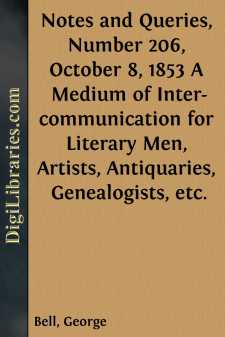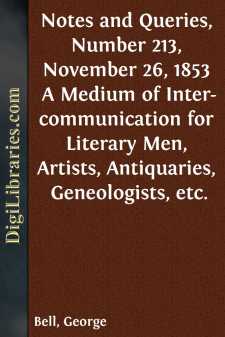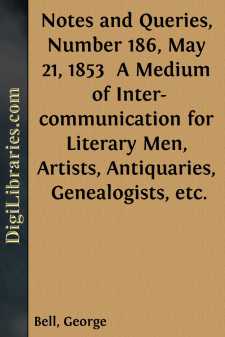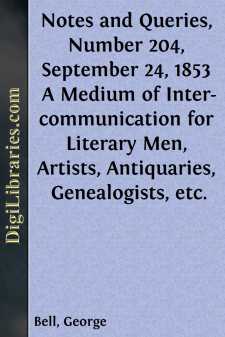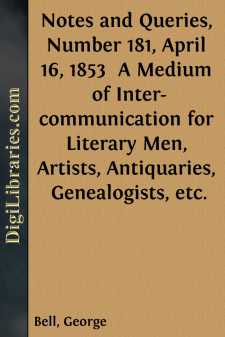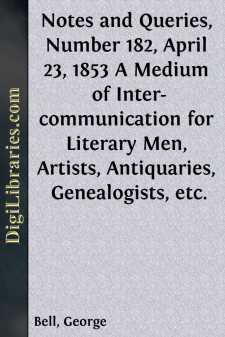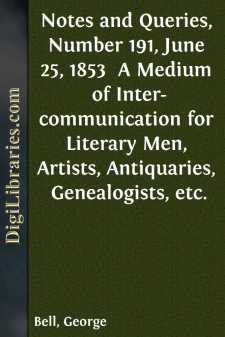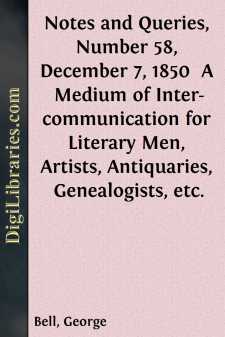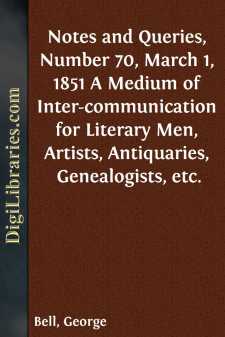Categories
- Antiques & Collectibles 13
- Architecture 36
- Art 48
- Bibles 22
- Biography & Autobiography 813
- Body, Mind & Spirit 142
- Business & Economics 28
- Children's Books 14
- Children's Fiction 11
- Computers 4
- Cooking 94
- Crafts & Hobbies 4
- Drama 346
- Education 46
- Family & Relationships 57
- Fiction 11828
- Games 19
- Gardening 17
- Health & Fitness 34
- History 1377
- House & Home 1
- Humor 147
- Juvenile Fiction 1873
- Juvenile Nonfiction 202
- Language Arts & Disciplines 88
- Law 16
- Literary Collections 686
- Literary Criticism 179
- Mathematics 13
- Medical 41
- Music 40
- Nature 179
- Non-Classifiable 1768
- Performing Arts 7
- Periodicals 1453
- Philosophy 64
- Photography 2
- Poetry 896
- Political Science 203
- Psychology 42
- Reference 154
- Religion 513
- Science 126
- Self-Help 84
- Social Science 81
- Sports & Recreation 34
- Study Aids 3
- Technology & Engineering 59
- Transportation 23
- Travel 463
- True Crime 29
Sort by:
by:
George Bell
NOTES ON NEWSPAPERS: "THE TIMES," DAILY PRESS, ETC. A newspaper, rightly conducted, is a potent power in promoting the well-being of universal man. It is also a highly moral power—for it quickens mind everywhere, and puts in force those principles which tend to lessen human woe, and to exalt and dignify our common humanity. The daily press, for the most part, aims to correct error—whether...
more...
by:
George Bell
THE STATE PRISON IN THE TOWER. A paragraph has lately gone the round of the newspapers, in which, after mentioning the alterations recently made in the Beauchamp Tower and the opening of its "written walls" to public inspection, it is stated that this Tower was formerly the place of confinement for state prisoners, and that "Sir William Wallace and Queen Anne Boleyn" were amongst its...
more...
by:
George Bell
DIVISION OF INTELLECTUAL LABOUR. Every one confesses, I believe, the correctness of the principle called "Division of labour." But if any one would form an adequate estimate of the ratio of the effect produced, in this way, to the labour which is expended, let him consult Dr. Adam Smith. I think he states, as an example, that a single labourer cannot make more than ten pins in a day; but if...
more...
by:
George Bell
LORD BACON'S "ADVANCEMENT OF LEARNING." Considering the large number of quotations from previous writers which occur in Lord Bacon's works, and especially in his most popular and generally read works—his Essays and his Advancement of Learning—it is remarkable how little his editors have done for the illustration of his text in this respect. The French editors of Montaigne's...
more...
by:
George Bell
EXTINCT VOLCANOS AND MOUNTAINS OF GOLD IN SCOTLAND. It is by some supposed that the Hill of Noth, in the parish of Rhynie, Aberdeenshire, had at one time been a volcano in full operation: others, again, maintain that the scoria found on and in the neighbourhood are portions of a vitrified fort, which had at one time stood on its summit. I am not aware that the matter has been investigated since our...
more...
by:
George Bell
"THE SHEPHERD OF BANBURY'S WEATHER-RULES." The Shepherd of Banbury's Rules to judge of the Changes of the Weather, first printed in 1670, was long a favourite book with the country gentleman, the farmer, and the peasant. They were accustomed to regard it with the consideration and confidence which were due to the authority of so experienced a master of the art of prognostication, and...
more...
by:
George Bell
Notes. POETICAL EPITHETS OF THE NIGHTINGALE. Having lately been making some research among our British poets, as to the character of the nightingale's song, I was much struck with the great quantity and diversity of epithets that I found applied to the bird. The difference of opinion that has existed with regard to the quality of its song, has of course led the poetical adherents of either side to...
more...
by:
George Bell
WITCHCRAFT IN SOMERSETSHIRE. Perhaps the following account of superstitions now entertained in some parts of Somersetshire, will be interesting to the inquirers into the history of witchcraft. I was lately informed by a member of my congregation that two children living near his house were bewitched. I made inquiries into the matter, and found that witchcraft is by far less uncommon than I had...
more...
by:
George Bell
FURTHER NOTES ON THE HIPPOPOTAMUS. The following remarks are supplementary to a note on the hippopotamus in Vol. ii, p. 35. In that note the exhibition of the hippopotamus at the Roman games is not traced lower than the time of the Emperor Commodus. Helagabalus, however, 218-22 A.D., had hippopotami among the various rare animals which he displayed in public as a part of his state. (Lamprid. c. 28) A...
more...
by:
George Bell
A WORD TO THE LITERARY MEN OF ENGLAND. "Twenty scholars in seven years might retrieve the worst losses we experience from the bigotry of popes and califs. I do not intend to assert that every Herculanean manuscript might, within that period, be unfolded; but the three first legible sentences might be; which is quite sufficient to inform the intelligent reader whether a farther attempt on the scroll...
more...


